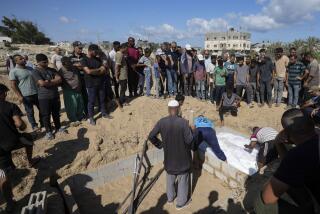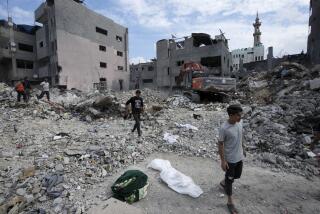After Battles, Iraqis Collect the Dead
- Share via
FALLOUJA, Iraq — Directed by U.S. Marines, two dozen Iraqi men collected corpses Tuesday in an effort to rid this devastated city of hundreds of bodies in keeping with Muslim burial practices.
Bodies lay in homes, on verandas and in shallow, makeshift graves. Muslims generally bury their dead within 24 hours, but combat has prevented the interment of most corpses.
Officers said the Marines could more quickly gather the estimated 1,200 insurgents killed during a week of fighting that took back the city, but they agreed with Iraqis who said it was crucial that they be the ones to retrieve fellow Muslims’ remains.
“We’re Iraqis and they’re Iraqis, and we want to get them,” said Mohammed Ali, a farmer who was helping to remove the bodies. “It’s in our religion. The rules say that relatives or families or Arabs should help them.”
Murmuring “God is great” and gagging from the stench of decomposition, the Iraqis had to take special care because insurgents might have booby-trapped some bodies with explosives. When the men pushed over one corpse, a grenade rolled out. The weapon didn’t detonate, but Marines hurried the workers away.
The collecting began Sunday, with 22 corpses removed for a pauper’s burial in a dusty lot on the outskirts of town.
The effort stalled Monday when workers provided by a local religious leader demanded that Marines first open a road to their village, but they resumed work after Marine Capt. Alex Henegar arranged a shipment of humanitarian aid. The crew recovered 14 bodies Tuesday.
Henegar, a civil affairs officer attached to the 3rd Battalion, 5th Marine Regiment, organized the body pickup in Fallouja’s northern neighborhoods.
A resident of Lookout Mountain, Ga., Henegar didn’t think any other collection efforts were underway in the city.
“There’s no real theory behind it. It’s the appropriate way of collecting the dead,” he said. “It’s their religion. They have their rites, and we want to allow them to do it. The idea is to show respect to them, the Iraqi people, and their religion.”
Henegar said authorities were eager to clear the city of bodies quickly to lessen health risks for returning civilians.
Gunfire could still be heard as Marines hunted insurgents, but its intensity was down significantly. Commanders said Fallouja was securely under their control.
Henegar said the 24 Iraqi volunteers were given latex gloves, surgical masks and hand disinfectant -- but no payment.
The Iraqis say the Koran prohibits payment for helping in a burial.
“We have a whole pot of money for short-term reconstruction projects like this, but they won’t take a dime,” Henegar said.
More to Read
Sign up for Essential California
The most important California stories and recommendations in your inbox every morning.
You may occasionally receive promotional content from the Los Angeles Times.










